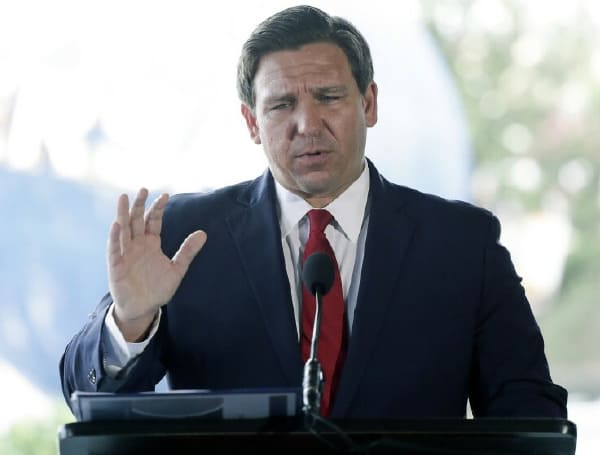A federal judge in Miami has upheld Florida Gov. Ron DeSantis’ executive order banning universal mask mandates in schools. In a decision handed do
A federal judge in Miami has upheld Florida Gov. Ron DeSantis’ executive order banning universal mask mandates in schools.
In a decision handed down on Wednesday, U.S. District Judge K. Michael Moore rejected a request for an injunction sought by 11 parents who sued DeSantis over the ban. Moore decided that the parents failed to meet the legal burden necessary to block the governor’s order.
According to court records, the plaintiffs challenged the DeSantis rule on the grounds that failing to require masks denied their children, some of whom have medical issues that put them at greater risk of contracting COVID-19, a “free appropriate public education,” as guaranteed under a federal law that funds education programs for children with physical or intellectual disabilities.
Moore noted that the law, the Individuals with Disabilities Education Act, or IDEA, established an administrative process that federal courts have said must be followed before filing lawsuits. Yet the plaintiffs eschewed that process, Moore noted, even as they repeatedly claimed their children were being denied an education. Accordingly, the judge wrote, “Their failure to do so weighs heavily against finding that Plaintiffs’ claims are likely to succeed on the merits.”
On a second issue, the plaintiffs claimed going the administrative route would be “futile” and “inadequate” because an administrative law judge holds no authority over the governor.
Yet, Moore noted, the IDEA requires that the administrative route still be taken. And even though the law allows for an exemption, those seeking the bypass must show concrete evidence why it should be granted. In this case, the judge said, all they offer is speculation as to why the process would not work.
Moreover, Moore ruled, their failure to pursue an administrative solution has not allowed for discussion of possible individualized remedies to the situations affecting their children.
For example, the judge said he could envision specific classrooms with universal mask mandates, outdoor lunchtime for immunocompromised students, specific classrooms with only vaccinated students, classrooms featuring frequent COVID-19 testing, and classrooms excluding students who chose medical opt-outs from masking. Yet the dismissal of the administrative process has inhibited such a discussion, Judge Moore wrote. In some cases, he added, the parents’ concerns could be addressed without prohibiting DeSantis’ order from being implemented.
Another problem Moore identified for the plaintiffs is that they have failed to include the Florida Department of Health in their demand for an injunction. That’s critical, Moore noted, because the Health Department created the rule with the opt-out provision on masking.
Moore indicated that an injunction on DeSantis’ order alone would not have any impact on the Health Department’s rule. Additionally, on this specific issue, the judge said the plaintiffs have undermined their own case because their children are not attending school even in districts that dissented from DeSantis and adopted universal mask mandates, or they are raising particular questions about masking, such as wearing them during lunch hours, that are tangential to the main debate.
Finally, Judge Moore maintained that the plaintiffs have failed to adequately show they will suffer “irreparable harm” if DeSantis’ order takes effect.
The key aspect there is that they ignored precedent set by a federal appellate court that determined denying educational services to a student completely is not the same as denying “authorization for him or her to receive those services at the school of his or her choice.”
“As in many other aspects of this case, the Court’s analysis is frustrated by the fact that there are numerous Plaintiffs that each face their own unique challenges,” Moore observed.
“Some of Plaintiffs are currently in school with universal mask mandates, some are in school without universal mask mandates, some are at home despite universal mask mandates being in place, and one is at home in circumstances where a universal mask mandate is not in place. These unique circumstances notwithstanding, there has been no allegation that any of Plaintiffs’ schools have denied Plaintiffs educational opportunities altogether.”
In conclusion, the judge noted, “The Court will not oblige Plaintiffs’ attempt to place a false choice before the Court. Plaintiffs would frame this case in a manner allowing for two rigid courses of action: (1) a path in which universal mask-wearing protects immunocompromised children in schools, or (2) a path where insufficient mask-wearing protocols needlessly put students at risk.”
“Yet, the facts before the Court make clear that these two paths are illusory and do not reflect the circumstances detailed in the record. For example, many Plaintiffs have raised concerns about medical opt-outs from universal mask mandates and lunchtime procedures. Some Plaintiffs are not sending their children to school despite that their children’s school districts currently have a universal mask mandate in place. Thus, Plaintiffs’ contention that an injunction of [DeSantis’ order] would remedy the harms posed to Plaintiffs’ children is, in large part, not borne out in the record.”
On one final point, the judge observed that the greater public interest must be balanced.
As much as medical authorities claim masks help, Moore noted, DeSantis and the Legislature “have expressed on behalf of those who elected them that returning to a sense of ‘normal’ is in the public interest as well.”
“The Court finds that under the circumstances presented in this case, Plaintiffs’ failure to exhaust their administrative remedies renders their requested relief to be out of line with the public interest,” he wrote.
“Only after Plaintiffs have availed themselves of their administrative remedies would their requested relief be, potentially, in line with the public interest.”
Support journalism by clicking here to our gofundme or sign up for our free newsletter by clicking here
Android Users, Click Here To Download The Free Press App And Never Miss A Story. It’s Free And Coming To Apple Users Soon.

COMMENTS